一般疑问句,否定句改写
- 格式:doc
- 大小:38.50 KB
- 文档页数:6
![一般疑问句,否定句以及对划线部分提问的答题方法[1]](https://uimg.taocdn.com/4ead43cd9b89680203d8255b.webp)
一般疑问句,否定句以及对划线部分提问的答题方法改为一般疑问句:1.先找am, is, are, was, were或can, would,放在最前面2.如果没有am, is, are, was, were或can, would,则看动词:(1)动词是过去式,句前加Did,动词变原形,其余照抄;(2)动词是第三人称单数,句前加Does,动词变原形,其余照抄。
(3)动词是原形,则句前加Do,其余照抄。
改为否定句:1.方法和上面一样,先找am, is, are, was, were或can, would,再后加not,其余照抄;2.如果没有am, is, are, was, were或can, would,则看动词:(1)动词为过去式,人后加didn’t,动词变原形,其余照抄;(2)动词为第三人称单数,人后加does n’t, 动词改为原形,其余照抄。
(3)动词为原形,则人后加don’t,其余照抄对划线部分提问:1.用适当的疑问词代替划线部分2.将剩余部分改为一般疑问句(注:如划线部分为主语,则用who代替,其余照抄;如划线部分为动词或动词短语,则用do代替,句前加what,再改为一般疑问句。
)学习小贴士:1.在be动词(is, am, are, was, were)或情态动词(can, may, must, should, would, could)后面加not,可以缩写成n’t. (情态动词后面动词用原形)如:I am a student. → I am not a student. (am not不能缩写)They are on the desk. → They are not on the desk.(are not = aren’t)2.在动词前加don’t, doesn’t, didn’t如:I have a pen.→ I don’t have a pen.She likes watching TV.→ She doesn’t like watch TV.(doesn’t后面用动词原形)We went to the park yesterday.→ We didn’t go to school yesterday. (didn’t 后面用动词原形) 3.祈使句的否定形式在句首在Don’t如: Open the door.→ Don’t open the door. (注意Don’t后面的单词开头字母不要大写)注:在改否定句时,如果句子中有some要改成any如:There are some birds in the tree.→ There aren’t any birds in the tree改一般问句和否定句要注意:☆ some 要变成 any如: There are some toys on the bed.→Are there any toys on the bed?☆第一人称(我)要与第二人称(你)互换如: I am at school now.→ Are you at school now? ( I 要变成you,所以be动词改成are)My father likes reading magazines.→ Does your father like reading magazines?对划线部分提问要注意:根据划线内容找出相对应的疑问词how和wh-词(what, when, where等),后面如有be动词或情态动词就跟be动词或情态动词,没有be动词或情态动词,后加do/does/did,划线部分的内容在问句中不出现。
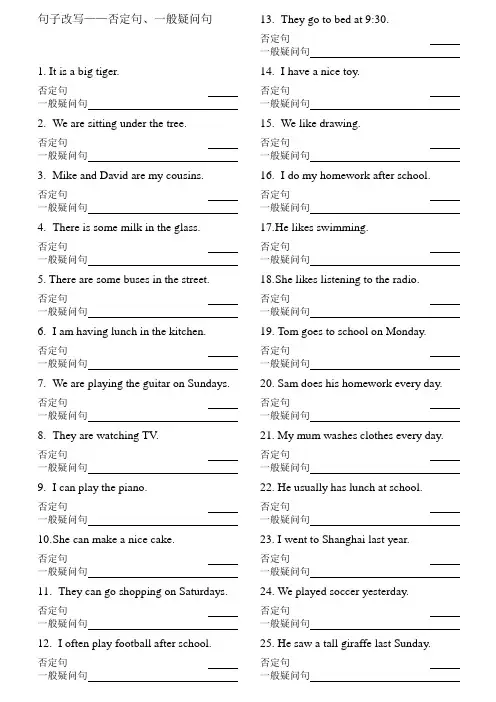
句子改写——否定句、一般疑问句1. It is a big tiger.否定句____________________________一般疑问句2.We are sitting under the tree.否定句____________________________一般疑问句3.Mike and David are my cousins.否定句____________________________一般疑问句4.There is some milk in the glass.否定句____________________________一般疑问句5. There are some buses in the street.否定句____________________________一般疑问句6.I am having lunch in the kitchen.否定句____________________________一般疑问句7.We are playing the guitar on Sundays.否定句____________________________一般疑问句8.They are watching TV.否定句____________________________一般疑问句9.I can play the piano.否定句____________________________一般疑问句10.S he can make a nice cake.否定句____________________________一般疑问句11.They can go shopping on Saturdays.否定句____________________________一般疑问句12.I often play football after school.否定句____________________________一般疑问句13.They go to bed at 9:30.否定句____________________________一般疑问句14.I have a nice toy.否定句____________________________一般疑问句15.We like drawing.否定句____________________________一般疑问句16.I do my homework after school.否定句____________________________一般疑问句17.H e likes swimming.否定句____________________________一般疑问句18.S he likes listening to the radio.否定句____________________________一般疑问句19. Tom goes to school on Monday.否定句____________________________一般疑问句20. Sam does his homework every day.否定句____________________________一般疑问句21. My mum washes clothes every day. 否定句____________________________一般疑问句22. He usually has lunch at school.否定句____________________________一般疑问句23. I went to Shanghai last year.否定句____________________________一般疑问句24. We played soccer yesterday.否定句____________________________一般疑问句25. He saw a tall giraffe last Sunday.否定句____________________________一般疑问句26.H e gave me a lot of new books.否定句____________________________ 一般疑问句。
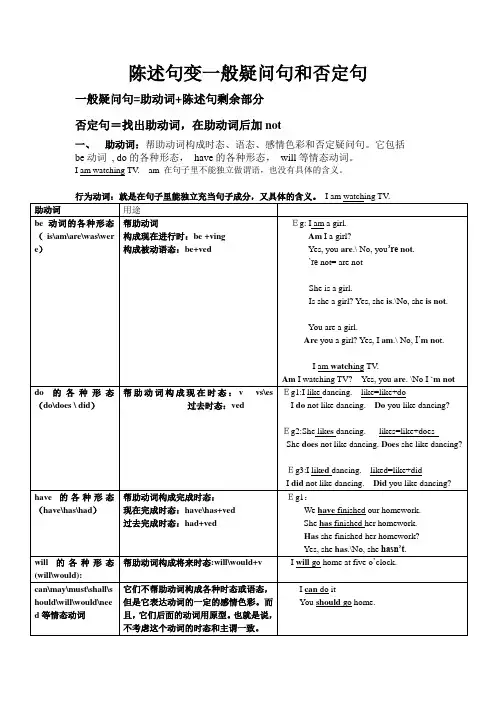
陈述句变一般疑问句和否定句一般疑问句=助动词+陈述句剩余部分否定句=找出助动词,在助动词后加not一、助动词:帮助动词构成时态、语态、感情色彩和否定疑问句。
它包括be动词, do的各种形态,have的各种形态,will等情态动词。
I am watching TV. am 在句子里不能独立做谓语,也没有具体的含义。
二、有的助动词既可以做助动词又可以做行为动词:be动词可以做行为动词,也可以做助动词。
行为动词是有实际意思,表示具体的动作,在句子里能够独立充当句子成分。
助动词是不具有实际意思,在句子里不能独立充当句子成分,只是帮助动词构成各种时态和语态三、学会通过助动词来判断谓语动词,来帮助读懂句子。
1、四类助动词,只有do是包含在谓语动词里的,其它的三个都是在谓语动词前面的。
2、很多助动词既可以做助动词又可以做实意动词。
当做助动词的时候,后面跟动词。
当做行为动词的时候,后面跟名词。
五、作业(一)用所给的词组成句子1、beautiful , a , she, pen, have1、he, rice, has , for , lunch.2、chicken, they , have, for ,rice, and ,lunch, tomatoes.3、school, after, Mary, goes, breakfast, to .4、in, a ,something, price, we, good , have.5、let, us, play, basketball6、believe, can’t, my, eyes, I7、are, goods, in, there, the, lots, shop, of8、how, T-shirt, how, is , your ?9、much, nice, are, these, how, socks?10、thirty-two, the ,are, dollars, books.11、good, the, many, a, colorful, coats, at, sells, price, shop.12、to, sister, loves, buy, my, Huaxing’s , on, T-shirts, sale.13、buys, Cindy, her, shop, some, from, flowers, this, mother.14、your, is, party, father’s, birthday, when?15、birthday, May, on, party, is, the, Jane’s, first.16、is, September, Nick’s, birth, Twenty-first, of, date.17、our, Kate, oldest, in ,is, class, the.18、your, how, old, is , brother?19、I, very, comedies, much, love.20、to, does, movies, want, see, she, a?21、my, Jack, actor, is, favorite.22、Beijing , I, Opera, I, movies, like, and, too, like .23、movies, do, what, you, kind, like, of?24、need, you, do, bags, sports, for25、much, game, how, is, the, computer.26、are, color, shoes, what, those27、his, have, sister, does, red, a, T-shirt28、likes, shoes, he, black, those(二)改写句子,变成一般疑问句和否定句。
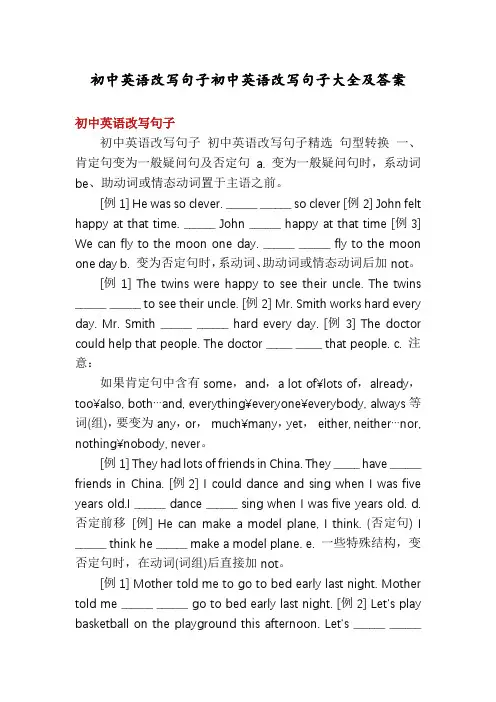
初中英语改写句子初中英语改写句子大全及答案初中英语改写句子初中英语改写句子初中英语改写句子精选句型转换一、肯定句变为一般疑问句及否定句 a. 变为一般疑问句时,系动词be、助动词或情态动词置于主语之前。
[例1] He was so clever. ______ ______ so clever [例2] John felt happy at that time. ______ John ______ happy at that time [例3] We can fly to the moon one day. ______ ______ fly to the moon one day b. 变为否定句时,系动词、助动词或情态动词后加not。
[例1] The twins were happy to see their uncle. The twins ______ ______ to see their uncle. [例2] Mr. Smith works hard every day. Mr. Smith ______ ______ hard every day. [例3] The doctor could help that people. The doctor _____ _____ that people. c. 注意:如果肯定句中含有some,and,a lot of¥lots of,already,too¥also, both…and, everything¥everyone¥everybody, always等词(组),要变为any,or,much¥many,yet,either, neither…nor, nothing¥nobody, never。
[例1] They had lots of friends in China. They _____ have ______ friends in China. [例2] I could dance and sing when I was five years old.I ______ dance ______ sing when I was five years old. d. 否定前移[例] He can make a model plane, I think. (否定句) I ______ think he ______ make a model plane. e. 一些特殊结构,变否定句时,在动词(词组)后直接加not。
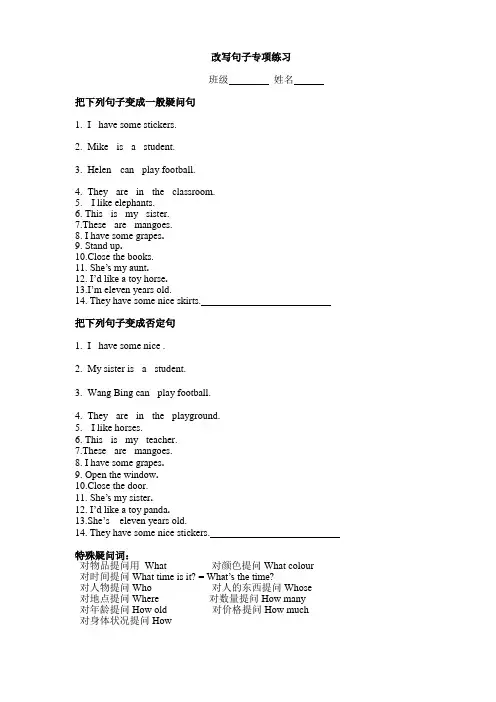
改写句子专项练习班级姓名把下列句子变成一般疑问句1. I have some stickers._______________________________________2. Mike is a student._______________________________________3. Helen can play football.________________________________________4. They are in the classroom.________________________________________5. I like elephants.________________________________________6. This is my sister._________________________________________7.These are mangoes.__________________________________________8. I have some grapes._________________________________9. Stand up._________________________________10.Close the books.________________________________11. She’s my aunt.________________________________________________12. I’d like a toy horse._______________________________13.I’m eleven years old. _____________________________________________14. They have some nice skirts.把下列句子变成否定句1. I have some nice ._______________________________________2. My sister is a student._______________________________________3. Wang Bing can play football.________________________________________4. They are in the playground.________________________________________5. I like horses.________________________________________6. This is my teacher._________________________________________7.These are mangoes.__________________________________________8. I have some grapes._________________________________9. Open the window._________________________________10.Close the door.________________________________11. She’s my sister.________________________________________________12. I’d like a toy panda._______________________________13.She’s eleven years old. _____________________________________________14. They have some nice stickers.特殊疑问词:对物品提问用What 对颜色提问What colour对时间提问What time is it? = What’s the time?对人物提问Who 对人的东西提问Whose对地点提问Where 对数量提问How many对年龄提问How old 对价格提问How much对身体状况提问How。
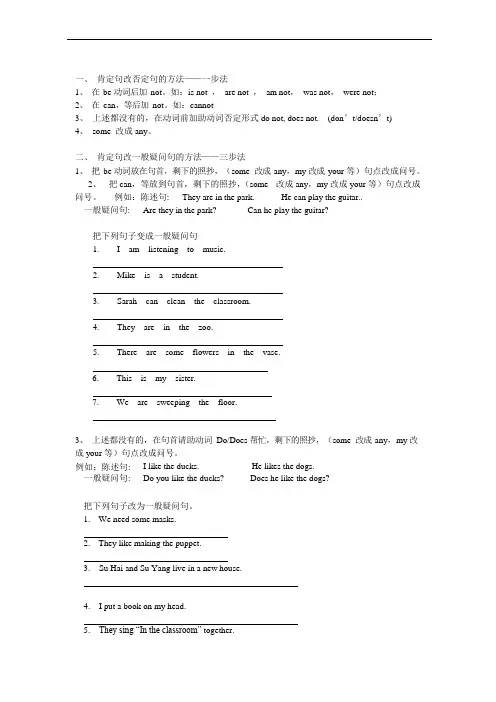
一、肯定句改否定句的方法——一步法1、在be 动词后加not。
如:is not ,are not ,am not,was not,were not;2、在can,等后加not。
如:cannot3、上述都没有的,在动词前加助动词否定形式do not, does not. (don’t/doesn’t)4、some 改成any。
二、肯定句改一般疑问句的方法——三步法1、把be 动词放在句首,剩下的照抄,(some 改成any,my 改成your 等)句点改成问号。
2、把can,等放到句首,剩下的照抄,(some 改成any,my 改成your 等)句点改成问号。
例如:陈述句: They are in the park. He can play the guitar..一般疑问句: Are they in the park? Can he play the guitar?把下列句子变成一般疑问句1. I am listening to music.2. Mike is a student.3. Sarah can clean the classroom.4. They are in the zoo.5. There are some flowers in the vase.6.This is my sister.7.We are sweeping the floor.3、上述都没有的,在句首请助动词Do/Does 帮忙,剩下的照抄,(some 改成any,my 改成your 等)句点改成问号。
例如:陈述句: I like the ducks. He likes the dogs.一般疑问句: Do you like the ducks? Does he like the dogs?把下列句子改为一般疑问句。
1.We need some masks.2.They like making the puppet.3.Su Hai and Su Yang live in a new house.4.I put a book on my head.5.They sing “In the classroom” together.6.We play basketball on Sundays.7.Tom likes listening to music三、肯定句改特殊疑问句的方法——四步法1、在一般疑问句的基础上,句首添加一个疑问词即可,可根据划线部分确定是什么疑问词。
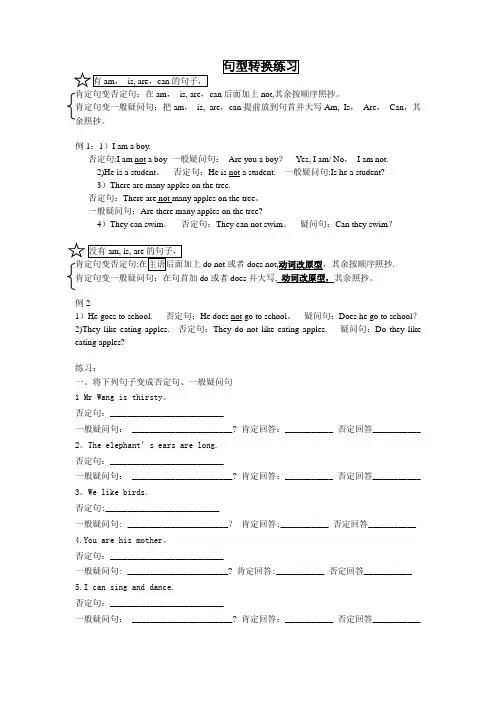
am,is, are,can后面加上not,其余按顺序照抄。
肯定句变一般疑问句:把am,is, are,can提前放到句首并大写Am, Is,Are,Can,其例1:1)I am a boy.否定句:I am not a boy 一般疑问句:Are you a boy?Yes, I am/ No,I am not.2)He is a student。
否定句:He is not a student. 一般疑问句:Is he a student?3)There are many apples on the tree.否定句:There are not many apples on the tree。
一般疑问句:Are there many apples on the tree?4)They can swim。
否定句:They can not swim。
疑问句:Can they swim?do not或者does not,动词改原型,其余按顺序照抄.肯定句变一般疑问句:在句首加do或者does并大写,动词改原型,其余照抄。
例21)He goes to school. 否定句:He does not go to school。
疑问句:Does he go to school?2)They like eating apples. 否定句:They do not like eating apples. 疑问句:Do they like eating apples?练习:一。
将下列句子变成否定句、一般疑问句1 Mr Wang is thirsty。
否定句:__________________________一般疑问句: _______________________? 肯定回答:___________ 否定回答___________ 2。
The elephant’s ears are long.否定句:__________________________一般疑问句: _______________________? 肯定回答:___________ 否定回答___________ 3。
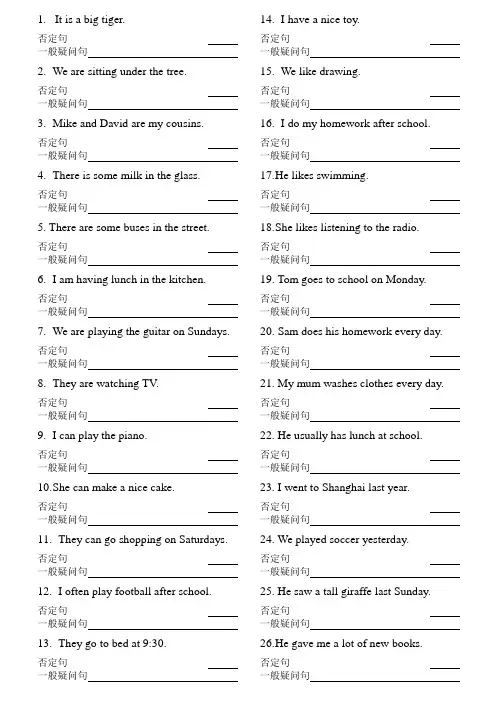
1.It is a big tiger.否定句____________________________一般疑问句2.We are sitting under the tree.否定句____________________________一般疑问句3.Mike and David are my cousins.否定句____________________________一般疑问句4.There is some milk in the glass.否定句____________________________一般疑问句5. There are some buses in the street.否定句____________________________一般疑问句6.I am having lunch in the kitchen.否定句____________________________一般疑问句7.We are playing the guitar on Sundays.否定句____________________________一般疑问句8.They are watching TV.否定句____________________________一般疑问句9.I can play the piano.否定句____________________________一般疑问句10.S he can make a nice cake.否定句____________________________一般疑问句11.They can go shopping on Saturdays.否定句____________________________一般疑问句12.I often play football after school.否定句____________________________一般疑问句13.They go to bed at 9:30.否定句____________________________一般疑问句14.I have a nice toy.否定句____________________________一般疑问句15.We like drawing.否定句____________________________一般疑问句16.I do my homework after school.否定句____________________________一般疑问句17.H e likes swimming.否定句____________________________一般疑问句18.S he likes listening to the radio.否定句____________________________一般疑问句19. Tom goes to school on Monday.否定句____________________________一般疑问句20. Sam does his homework every day.否定句____________________________一般疑问句21. My mum washes clothes every day.否定句____________________________一般疑问句22. He usually has lunch at school.否定句____________________________一般疑问句23. I went to Shanghai last year.否定句____________________________一般疑问句24. We played soccer yesterday.否定句____________________________一般疑问句25. He saw a tall giraffe last Sunday.否定句____________________________一般疑问句26.H e gave me a lot of new books.否定句____________________________一般疑问句。
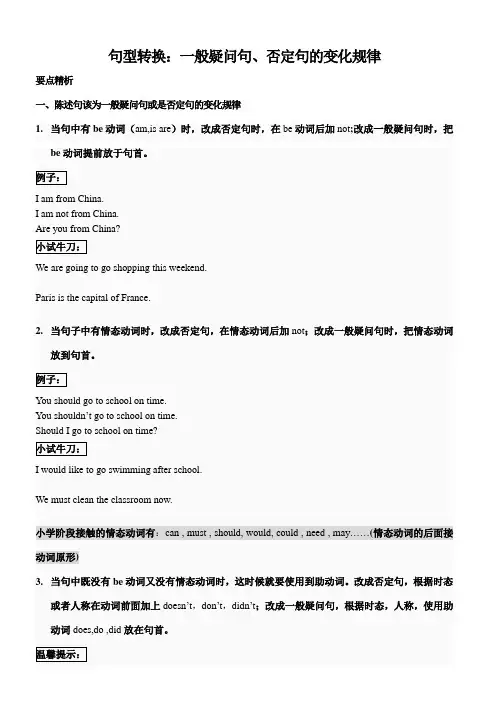
句型转换:一般疑问句、否定句的变化规律要点精析一、陈述句该为一般疑问句或是否定句的变化规律1.当句中有be动词(am,is are)时,改成否定句时,在be动词后加not;改成一般疑问句时,把2.I would like to have some milk. (改成一般疑问句) ——————————————————————————3.They often go to the library on the weekend.( 改成一般疑问句) ——————————————————————————4.My friend go to school on foot. (改为否定句)——————————————————————————5.I am going to do my homework tomorrow.( 改成一般疑问句) ——————————————————————————6.Please read Lesson One.(改为否定句)_________ __________ Lesson One,please.7.Jackie has lunch at schoo1.(改为一般疑问句)_________ Jackie __________ lunch at school ?8. They go to bed early.(改为一般疑问句)________ they ________ to bed early?9. Mike does well in English. (改为否定句)Mike _______ _______ well in English.10.u Hai and Su Yang look the same.(改为一般疑问句)_______ Su Hai and Su Yang _______ the same?11. They studied at Guangzhou International school.(改为一般疑问句) _______ they _______ at Guangzhou International school?12. There is some water in the bottle.(改为一般疑问句)_______ there _______ water in the bottle?2.用情态动词的情况下有特殊情况。
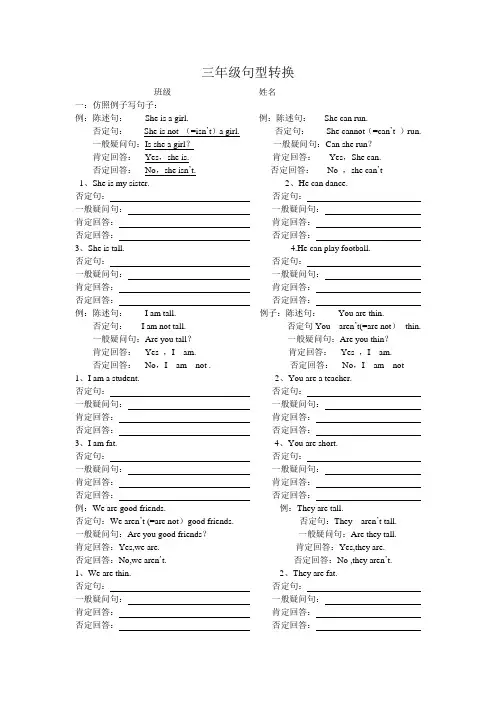
三年级句型转换班级__________ 姓名______________一:仿照例子写句子:例:陈述句:She is a girl. 例:陈述句:She can run.否定句:She is not (=isn’t)a girl. 否定句:She cannot(=can’t )run.一般疑问句:Is she a girl?一般疑问句:Can she run?肯定回答:Yes,she is. 肯定回答:Yes,She can.否定回答:No,she isn’t. 否定回答:No ,she can’t1、She is my sister.2、He can dance.否定句:否定句:一般疑问句:一般疑问句:肯定回答:肯定回答:否定回答:否定回答:3、She is tall. 4.He can play football.否定句:否定句:一般疑问句:一般疑问句:肯定回答:肯定回答:否定回答:否定回答:例:陈述句:I am tall. 例子:陈述句:You are thin.否定句:I am not tall. 否定句You aren’t(=are not)thin.一般疑问句:Are you tall?一般疑问句:Are you thin?肯定回答:Yes ,I am. 肯定回答:Yes ,I am.否定回答:No,I am not . 否定回答:No,I am not1、I am a student.2、You are a teacher.否定句:否定句:一般疑问句:一般疑问句:肯定回答:肯定回答:否定回答:否定回答:3、I am fat.4、You are short.否定句:否定句:一般疑问句:一般疑问句:肯定回答:肯定回答:否定回答:否定回答:例:We are good friends. 例:They are tall.否定句:We aren’t (=are not)good friends. 否定句:They aren’t tall.一般疑问句:Are you good friends?一般疑问句:Are they tall.肯定回答:Yes,we are. 肯定回答:Yes,they are.否定回答:No,we aren’t. 否定回答:No ,they aren’t.1、We are thin.2、They are fat.否定句:否定句:一般疑问句:一般疑问句:肯定回答:肯定回答:否定回答:否定回答:二:根据例句改写句子。
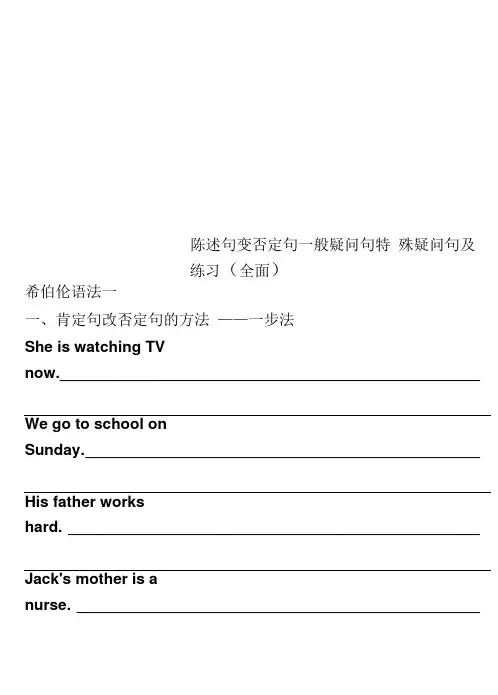
陈述句变否定句一般疑问句特殊疑问句及练习(全面)希伯伦语法一一、肯定句改否定句的方法——一步法She is watching TVnow. _________________________________________________We go to school onSunday. ______________________________________________His father workshard. ________________________________________________Jack's mother is anurse. _______________________________________________The cat runsfast. _________________________________________________They like readingbooks. _______________________________________________My grandpa gives me a hotdog. _________________________________________________Tom often walks toschool.I have adoll. _________________________________________________It is eatingfish. _________________________________________________下列句子变成一般疑问句1. I am listening tomusic. _____________________________________2. Mike is a student.3. Sarah can clean theclassroom.4. They are in thezoo.5. There are some flowers in thevase.6. This is mysister.7・We are sweeping thefloor.1. We need some masks. _______________________________2. They like making thepuppet. ________________________________3. Su Hai and Su Yang live in a newhouse. _______________________________________________4.1 p ut a book on myhead. ________________________________________________ 5. They sing “In theclassroom ” together. __________________________________6. We play basketball onSundays. _____________________________________________7. Tom likes listening tomusic ___________________________________________综合训练(一)陈述句变一般疑问句练习1. His father is an English teacher.2. These cats are crying.3. They can swim.4. I like to read English.5. I go to school on foot.6. He likes English.7. His father goes to work by bus.8. He is crying under the tree.9. His birthday is on the twentieth of November.10. Mrs. Li and Kitty are in a big shop.11. Kitty is wearing her new uniform.12. The boy under the tree is hungry.13. He goes to school every day.15. I want to have a model car.16. She wants a cup of coffee.17. Mrs. Li and Kitty watch television at night.18. I do my homework after school综合训练(二)将下列句子改成一般疑问句:1. It is a lovely dog .-2. She is lovelygirl. _______________________________________3. You are a singer. _____________________________4. They are Lily ' s cousins.5. We are classmates.6. I am a doctor.7. There is a bird in the tree.8. There are many stars in the sky.10.1 love my parents.11.1 play computer games every night. 14・We have a pleasant home. 15. W e like to climb the mountain. 16. They go to church on Sunday. 17. They walk to school every morning.18.lt is a beautiful park.______________________________ 3 •划线部分是谓语动词及宾语时,应使用what …do/doing/done 替换划线部分。
一般疑问句的改写方法
1.使用助动词:把句子中的动词放在主语之前并加上适当的助动词。
例如:
原句:They are going to the party.
改写:Are they going to the party?
2.使用倒装结构:把助动词放在主语之前并把原来的主语移到助动词之后。
例如:
原句:She can speak French.
改写:Can she speak French?
3. 使用do/does/did:把动词原形改为do/does/did,并把原来的主语移到do/does/did之后。
例如:
原句:He plays soccer.
改写:Does he play soccer?
4.使用否定词:把肯定句改为否定句,并把原来的主语移到否定词之后。
例如:
原句:You have seen that movie.
改写:Haven't you seen that movie?
这些方法可以根据具体的句子结构和时态来选择合适的改写方式。
一般疑问句的改写方法可以帮助我们更灵活地表达问题或修改陈述句为疑问句。
英语否定句和一般疑问句改写口诀《英语否定句和一般疑问句改写口诀一》小朋友们听仔细,否定句呀有奥秘。
一找动词是第一,就像寻找小宝贝。
如果动词是be词,直接后面加not字。
好比给它戴个帽,否定意思就来到。
若是实意动词在,助动词来把忙帮。
do或者does上场,这个规则要记详。
原来动词要还原,就像玩具放回仓。
一般疑问句也不难,be动词先到最前端。
就像士兵站排头,后面跟着那主宾。
实意动词要发问,助动词就向前奔。
语序调整别混乱,就像排队站得端。
《英语否定句和一般疑问句改写口诀二》否定句改写不用慌,一观句子结构强。
若是be动词现形,not紧跟莫要忘。
这就如同加把锁,否定意义锁住了。
遇到行为动词时,do或does来加持。
否定词not随后缀,动词变回原样子。
好比魔法被撤销,最初模样才对味。
再说一般疑问句,be动词提前要牢记。
如同火车头在前,拉着车厢跑向前。
要是实意动词句,助动词开头来领路。
主语乖乖后面跟,语序就像走正步。
《英语否定句和一般疑问句改写口诀三》改写否定有诀窍,首先来把动词瞧。
be动词它很乖巧,not加上就否定掉。
如同给画遮块布,原来意思被挡住。
要是动词为实意,do does来处理。
not就像小尾巴,贴在后面笑嘻嘻。
动词变回最初形,就像树叶落回地。
一般疑问句也妙,be动词提前来报道。
好像小鸟先出巢,后面跟着伙伴鸟。
实意动词的句子,助动词先行来开道。
句子顺序安排好,整齐就像列早操。
《英语否定句和一般疑问句改写口诀四》否定句呀要写对,动词类别先归类。
be动词在句中睡,not一添就到位。
好似给星遮光辉,否定之意在周围。
遇到实意动词堆,助动词得把场归。
do does来做守卫,not紧跟别掉队。
动词还原像回归,原位才是它的队。
一般疑问句不难会,be动词跑到首位。
如同班长站首位,带着全班齐步退。
实意动词的语句,助动词向前迈大步。
主谓顺序不糊涂,就像桥搭得牢固。
《英语否定句和一般疑问句改写口诀五》小朋友们来听讲,否定句改有良方。
改为一般疑问句和否定句
一般疑问句:你能将标题改为一般疑问句和否定句吗?
否定句:你不能将标题改为一般疑问句和否定句。
正文:标题改为一般疑问句和否定句是一种常见的语法练习,可以帮助我们理解和运用不同句型。
在这个练习中,我们需要将给定的标题改写为一般疑问句和否定句。
一般疑问句用于询问肯定或否定的回答,而否定句则表达否定的意思。
在改写标题为一般疑问句时,我们需要在句首加上动词或助动词,并在句末加上问号。
例如,将标题改为一般疑问句的过程如下:
原标题:你能将标题改为一般疑问句和否定句吗?
一般疑问句:能将标题改为一般疑问句和否定句吗?
在将标题改写为否定句时,我们需要在动词前加上否定词'not'。
以
下是将标题改写为否定句的示例:
原标题:你能将标题改为一般疑问句和否定句吗?
否定句:你不能将标题改为一般疑问句和否定句。
通过练习改写标题为一般疑问句和否定句,我们可以更好地理解这些
句型的用法和结构。
这对于我们提高英语表达能力和进一步学习语法都非常有帮助。
i love my good patient on station
改为一般疑问句并用否定回答
一般疑问句:Do you love your good patient on station?
否定回答:No, I don't love my good patient on station.
这是一个一般现在时的陈述句,要将它改成一般疑问句,需要在句首添加助动词“Do”,并将主语“i”改为“you”。
如果要进行否定回答,需要使用“No”来表示否定,并在后面添加主语和助动词的否定形式“don't”。
需要注意的是,在实际交流中,这样的表达可能会比较直接和生硬。
如果你想更加委婉地表达自己的意思,可以使用一些其他的表达方式,例如:“I don't have a good feeling towards my patient on station”或者“I don't think I love my patient on station that much”。
这样的表达方式更加委婉,可以更好地保护对方的感情和尊严。
改一般疑问句的方法
一般疑问句是一种句式,用来表达某种疑问或示意。
它们常常出现在电影或书中,因为它们可以帮助人们理解发生了什么。
下面就介绍一般疑问句改写的方法。
首先,读者需要明确原句的意思。
一般疑问句一般会涉及到某事是否发生,或者某人是否做某件事。
回答此类问题的方式通常是使用反意疑问句,如:“Did it happen?”成:Did it not happen?
其次,读者可以通过把原句变成一般句来改写一般疑问句。
例如,从“Did you do it?”成:You did it.”
第三,读者可以把一般疑问句变成特殊疑问句来改写。
特殊疑问句除了问句本身外,还涉及到另外一个部分,即答案。
比如,从“Are you going?”成“Where are you going?”
最后,读者可以把一般疑问句变成否定句来改写。
否定句一般会涉及到“not”或“never”等词,如从“Do you like it?”成:You don like it.”
总之,一般疑问句可以改写为反意疑问句、一般句、特殊疑问句和否定句这几种句式。
它们可以让读者更容易理解句子的意思,也能让文章显得更加活泼生动。
当然,读者应该根据文章的需要来选择最合适的句式,以便把精彩的故事讲给读者。
- 1 -。
英语语法题:改写否定句和一般疑问句1.It is a big tiger.否定句____________________________一般疑问句2.We are sitting under the tree.否定句____________________________一般疑问句3.Mike and David are my cousins.否定句____________________________一般疑问句4.There is some milk in the glass.否定句____________________________一般疑问句5. There are some buses in the street.否定句____________________________一般疑问句6.I am having lunch in the kitchen.否定句____________________________一般疑问句7.We are playing the guitar on Sundays.否定句____________________________一般疑问句8.They are watching TV.否定句____________________________一般疑问句9.I can play the piano.否定句____________________________一般疑问句10.S he can make a nice cake.否定句____________________________一般疑问句11.They can go shopping on Saturdays.否定句____________________________一般疑问句12.I often play football after school.否定句____________________________一般疑问句13.They go to bed at 9:30.否定句____________________________ 一般疑问句14.I have a nice toy.否定句____________________________ 一般疑问句15.We like drawing.否定句____________________________ 一般疑问句16.I do my homework after school.否定句____________________________ 一般疑问句17.H e likes swimming.否定句____________________________ 一般疑问句18.S he likes listening to the radio.否定句____________________________ 一般疑问句19. Tom goes to school on Monday.否定句____________________________ 一般疑问句20. Sam does his homework every day.否定句____________________________ 一般疑问句21. My mum washes clothes every day.否定句____________________________ 一般疑问句22. He usually has lunch at school.否定句____________________________ 一般疑问句23. I went to Shanghai last year.否定句____________________________ 一般疑问句24. We played soccer yesterday.否定句____________________________ 一般疑问句25. He saw a tall giraffe last Sunday.否定句____________________________ 一般疑问句26.H e gave me a lot of new books.否定句____________________________ 一般疑问句。
一般疑问句一般疑问句是疑问句的一种。
它是指用yes(是)或no(否)来回答的句子。
其结构是:系动词be/助动词/情态动词+主语+其他成分通常回答为:肯定:Yes,+主语+提问的助动词.否定:No,+主语+提问的助动词+not. 如:Are you from Japan﹖Yes I am./ No I’m not.Is her sister doing her homework now﹖Yes she is. / No she isn't.Does he work in a bank﹖Yes he does. / No he doesn't.Do you live near your school﹖Yes I do. / No I don't.Can you speak French﹖Yes I can. / No I can't.May I go home now﹖Yes you may. / No you mustn't.注意:1.将陈述句变为一般疑问句时,如句中有be 动词(am/ is/ are)时,可直接将它们提至主语前。
如主语为第一人称,应将其改为第二人称。
如:I’m in Class 2Grade 1.→Are you in Class 2Grade 1﹖We’re watching TV.→Are you watching TV﹖2.陈述句中有情态动词(can may must …)时,也可直接将它们提至主语前,即可成为一般疑问句。
如:He can swim now.→Can he swim now﹖The children may come with us.→ May the children come with us﹖3.陈述句中只有一个实义动词作谓语且其时态为一般现在时,变为一般疑问句时要在句首加do或does 主语后的实义动词用原形。
如:I like these animals.→Do you like these animals﹖She wants to go to the movies.→ Does she want to go to the movies﹖4.一般疑问句一般读升调(↑)5.一般疑问句有时不用yes或 no 回答。
如:Are they in town now﹖I think so.May I sit here﹖Certainly.Does he like soccer﹖Sorry I don't know.6。
一般疑问句的第一单词总是虚词,读的时候要读轻声.二、特殊疑问句以疑问词开头,对句中某一成分提问的句子叫特殊疑问句.常用的疑问词有:what(什么), who(谁), whose(谁的), which(哪个), when (何时), where(哪里), how(怎样), why(为何)等.特殊疑问句有两种语序:1.如疑问词作主语或主语的定语,即对主语或主语的定语提问,其语序是陈述句的语序:疑问词(+主语)+谓语动词+其他成分?如: who is singing in the room﹖whose bike is broken﹖2.如疑问词作其他成分,即对其他成分提问,其语序是:疑问词+一般疑问句语序? 如:what class are you in﹖What does she look like﹖Where are you from﹖What time does he get up every morning﹖How do you know﹖注意:1.回答特殊疑问句时,不能用yes / no,即问什么答什么,尤其是简略回答。
括号内是完整回答所需部分。
如:Who is from Canada﹖Helen (is from Canada).Where's the restaurant﹖(It is)Near the station.Why do you like koalas﹖(I like koalas)Because they are cute.2.特殊疑问句一般读降调(↓)。
改一般疑问句的方法一般疑问句,否定句以及根据答句写问句的答题方法改为一般疑问句:先找be动词(am, is, are),或can,放在句子最前面,如果没有则判断是否为第三人称单数(he/she /it/ Mike…),是则把动词改为原形,句前加Does,其余照抄。
还不是,则句前加Do,其余照抄。
改为否定句:方法和上面一样,先找be动词(am, is, are),或can,再后加not,其余照抄不是则判断是否为第三人称单数(he/she /it/ Mike…),是则把动词改为原形,人后加doesn’t,其余照抄还不是,则人后加don’t,其余照抄根据答句写问句的方法:①用适当的疑问词(who , whose , what , how, how many , when ,why)来提问,②将剩余部分改为一般疑问句(如果剩余部分为动词或动词短语,则用do代替,句前加what,再改为一般疑问句)一般现在时的句子结构:标志:usually , often , sometimes, everyday , always …句子结构: sb + V例如:I V原形He/ She/ It/ Mike/My mother… + V-s或 V-esYou/ We/ They /My parents… V原形Eg. Mike usually does sports at 4:30.We often go hiking on weekends.现在进行时的句子结构:标志:look, listen , now …句子结构:sb +be(am, is, are) + V ing例如:I amHe/ She/ It/ Mike/My mother… + is + V ingYou/ We/ They /My parents… a reEg. I am reading under the tree.She is cooking in the kitchen.疑问句、否定句句型变换测试题姓名:________ 分数:________按要求改写句子。
(2.5′× 40 = 100)1.She is in the kitchen. (改为一般疑问句)________________________________2.They are in the bedroom。
(改为否定句)________________________________3.Is it in the classroom? (作否定回答)________________________________4.Are they near the desk?(作否定回答)________________________________5.My books are in the bag. (就划线部分提问)________________________________6.It is time to go to school。
(变成否定句)________________________________7.Tom watches TV every evening. (改为否定句)________________________________8.I do my homework every day。
(改为一般疑问句,作否定回答)__________________________________________________9.She likes milk。
(改为一般疑问句,作肯定回答)__________________________________________________10.John comes from Canada. (对划线部分提问)________________________________11.She is always a good student. (改为一般疑问句,作否定回答)__________________________________________________12.Peter and Joy like going skating。
(改为否定句)________________________________13.I’d like some juice. (对划线部分提问)________________________________14.I’d like to go swimming. (对划线部分提问)________________________________15.I’m in the park. (对划线部分提问)________________________________16.I’m interested in dancing。
(改为一般疑问句)________________________________17.She is not good at drawing. (变为肯定句)________________________________18.Today is Saturday. (对划线部分提问)________________________________19.There are seven days in a week. (对划线部分提问)________________________________20.We have PE class on Tuesday。
(对划线部分提问)___________________________________________________22.We go to school every morning。
(改为否定句)_____________________________________23.He speaks English very well. (改为否定句)_____________________________________24.I like taking photos in the park。
(对划线部分提问)_____________________________________25.My father is a teacher。
(对划线部分提问)_____________________________________26.I will make the bed. (改为一般疑问句)_____________________________________27.Can you clean the tables and chairs? (作否定回答)______________________________________28.We can go there by coach. (对划线部分提问)______________________________________29.I am ten years old。